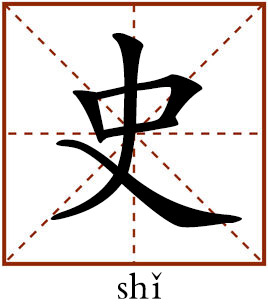History

The basic meaning of this character is history. It is also a surname. This character in oracle bone script is composed of two parts. The upper part represents a container used to store documents and the part under it represents a hand. They together symbolize a person in charge of recording events, or a historian.
以史为镜
yǐ shǐ weí jìng
Shi refers to history while jing is a mirror. This term literally means using history as a mirror.
This term originated from a famous saying by Emperor Taizong of Tang (598–649). During his reign, a man named Wei Zheng (580–643) served as an important chancellor in the court.
Wei emphasized propriety and opposed overextending the state. He often spoke against the emperor’s opinions which he thought to be wrong despite Emperor Taizong’s anger, and while Emperor Taizong did not accept everything that Wei said, he always treated Wei with respect. After Wei Zheng’s death, the emperor commented that Wei was a mirror to show the mistakes of the court—“Using copper as a mirror allows one to keep his clothes neat. Using history as a mirror allows one to see future trends. Using a person as a mirror allows one to see what is right and what is wrong. When Wei Zheng died, I lost a mirror.”
This term emphasized the value of studying history. History is more than a collection of meaningless dates on a calendar; it provides humans with a chance to know how the world functions and develops and to predict what the future may bring about.
Studying history has always been highly valued in China. All the rulers of ancient dynasties equipped their states with court historians, whose duty was to record major events of the time and how the emperors ruled the state. In order to assure those recordings were fair and objective, rulers had no right to read them. There was also another kind of court historian specializing in compiling and studying the history of previous dynasties. Through their work, rulers could learn from the achievements and mistakes that previous rulers had made.
edited by REN GUANHONG
